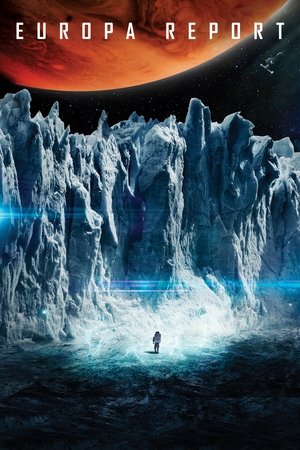
Europa Report
Europa Report is one of those low-budget sci-fi films that crop up occasionally and start making the rounds on genre websites (my own first blush with the film was on io9.com) to create a buzz. Since Hollywood has depressingly sworn off any films that aren't megabudget tentpoles with an already-established audience anticipation index (read: sequels, remakes, or pre-existing properties), this kind of high-minded-but-low-budget genre films is a rarity at best. In the film, six astronauts embark on a mission to (as one would expect) Europa, one of Jupiter's moons, after recent discoveries show a possibility of microbial life underneath its icy oceans. What we see is the recorded video from their ship's cameras (yes, it's a found footage film) that tells the story of their ill-fated voyage. It's a simple premise, and director Sebastián Cordero seems to be a bit unsure of himself at the outset. The film refuses to follow a linear narrative; even before the main title appears, we join the crew many months into their trip, and are given the knowledge that there's obviously been an incident onboard already, one that's robbed the journey of one of their intrepid space explorers. Two things worried me at the outset of the film: one: the much-ballyhooed attention to detail (the filmmakers brought on NASA to ensure an unprecedented degree of scientific accuracy) and two: that constantly-shifting timeline of the film. The first point was worrisome because most films that tout so heavily their technical accuracy forget to be dramatically compelling, and the second (similarly) because an overreliance on storytelling gimmicks to keep the audience's interest often betrays a weak story. Happily, neither caused the film to fail: the attention to detail enhanced rather than detracted, and while the unnecessary nonlinearity of the storytelling didn't go away until the end, it did finally calm down enough for the audience to orient themselves. Given that I know now how the story unfolds, I can say that it would have actually been more dramatically compelling for the audience if the film had just told itself in a more straightforward manner. Ultimately, though, it works fine, just slightly weaker than it could have been. The bare-bones plot is aided by some smart writing that refuses to dip into easy characterizations and instead defines its astronauts by their mission, rather than cliched, singular personality traits. While refreshing to see, it does leave some of the characters as relative cyphers, but strong performances all around (including District 9's Sharlto Copley and The Girl with the Dragon Tattoo's Michael Nyqvist) get the film over that slight bump. What's most gratifying about the film, however, is that it never loses its sense of awe. The film refuses to give in to the cynical pessimism of big-budget sci-fi fare, and its astronauts recognize the immense importance of their mission, particularly when things start to go south. Cordero keeps the tension ratcheted up, never letting the audience forget just how innately tenuous safety during space travel is. The performances are all good, and Copley in particular is a standout. But what I appreciated most about the film was its tactile nature, a by-product of its low budget. The difference between models and fully CGI creations is literally tangible. A week or so ago, I watched Disney's 1979 film The Black Hole for the first time, and while the green-screening of that flawed film is terribly shoddy, its effects stand miles taller than most of the genre fare produced today, if only by virtue of the fact that being real, they informed the cinematography and performances around them. Europa Report fits in comfortably beside Duncan Jones' fantastic low-budget Moon, and while not perfect, compares favorably to that modern classic. This class of film can either be a failure (see: Apollo 18) or a classic (the aforementioned Moon); Europa Report isn't flawless, but it's a great entry in the canon of smart, well-made sci-fi.
